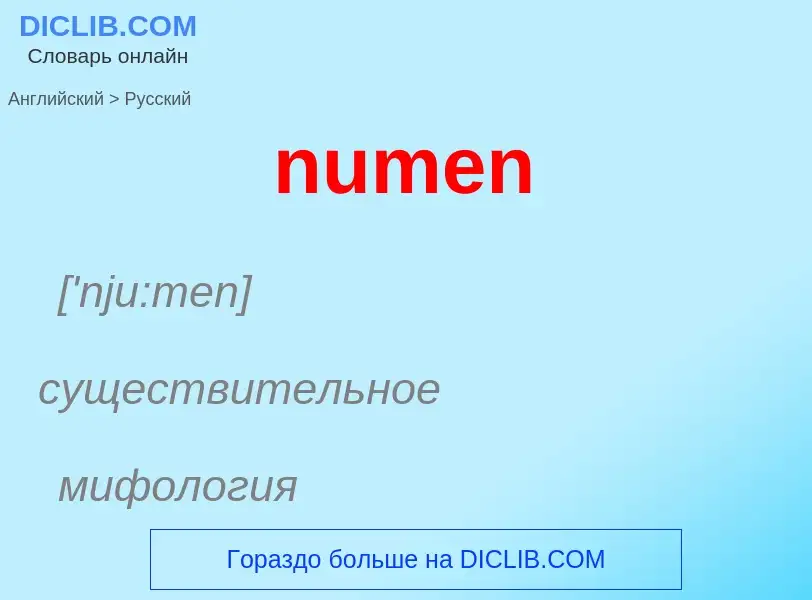Μετάφραση και ανάλυση λέξεων από τεχνητή νοημοσύνη
Σε αυτήν τη σελίδα μπορείτε να λάβετε μια λεπτομερή ανάλυση μιας λέξης ή μιας φράσης, η οποία δημιουργήθηκε χρησιμοποιώντας το ChatGPT, την καλύτερη τεχνολογία τεχνητής νοημοσύνης μέχρι σήμερα:
- πώς χρησιμοποιείται η λέξη
- συχνότητα χρήσης
- χρησιμοποιείται πιο συχνά στον προφορικό ή γραπτό λόγο
- επιλογές μετάφρασης λέξεων
- παραδείγματα χρήσης (πολλές φράσεις με μετάφραση)
- ετυμολογία
numen - translation to ρωσικά
['nju:men]
существительное
мифология
божество
таинственная высшая сила
['nju:minə]
общая лексика
от numen
Ορισμός
Βικιπαίδεια

Numen (plural numina) is a Latin term for "divinity", "divine presence", or "divine will." The Latin authors defined it as follows: Cicero writes of a "divine mind" (divina mens), a god "whose numen everything obeys," and a "divine power" (vis divina) "which pervades the lives of men." It causes the motions and cries of birds during augury. In Virgil's recounting of the blinding of the one-eyed giant, Polyphemus, from the Odyssey, in his Aeneid, he has Odysseus and his men first "ask for the assistance of the great numina" (magna precati numina). Reviewing public opinion of Augustus on the day of his funeral, the historian Tacitus reports that some thought "no honor was left to the gods" when he "established the cult of himself" (se ... coli vellet) "with temples and the effigies of numina" (effigie numinum). Pliny the younger in a letter to Paternus raves about the "power," the "dignity," and "the majesty;" in short, the "numen of history." Lucretius uses the expression numen mentis, or "bidding of the mind," where "bidding" is numen, not, however, the divine numen, unless the mind is to be considered divine, but as simply human will.
Since the early 20th century, numen has sometimes been treated in the history of religion as a pre-animistic phase; that is, a belief system inherited from an earlier time. Numen is also used by sociologists to refer to the idea of magical power residing in an object, particularly when writing about ideas in the western tradition. When used in this sense, numen is nearly synonymous with mana. However, some authors reserve use of mana for ideas about magic from Polynesia and southeast Asia.


